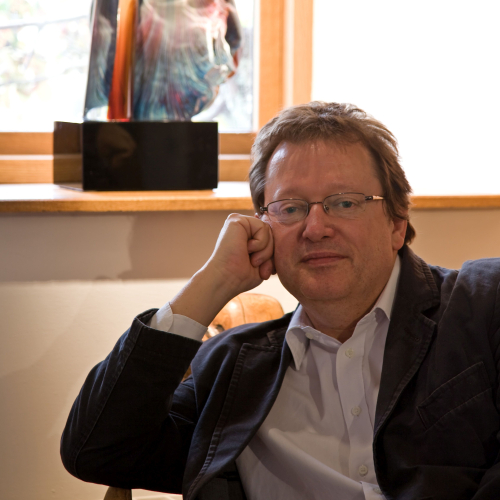
Dr Peter Claus
I am chiefly responsible as Access Fellow for a professional network of universities, schools and third-sector organisations in London, the North West and the North East that encourage pupils from challenging socio-economic circumstances to enter Oxford and other competitive universities. The ‘Hub’ model for widening access was launched in 2008 and is a cross-collegiate and multi-university initiative that offers intensive preparatory academic courses under the banner of OxNet. It is a regional and community-based approach designed to attract potential candidates from the lowest social quintiles to apply for the least popular subjects (and others) in Oxford, Cambridge, and other research-intensive institutions.
As a historian at Pembroke, I am currently writing a book on the “East End Underworld” in the twentieth century and the third edition of a textbook on historiography co-authored with John Marriott, both for Routledge. The combination of these Access activities and historical research has developed an historical interest in the metropolis and a commitment to research on outreach, public engagement, and the democratisation of the archive.
A poor formative education led initially to short-term building and farming labouring jobs, shop work, driving and working on market stalls. Later enrolling at The Open University (OU), a beacon in the 1980s of egalitarian education, I experienced the intrinsic thrill of learning. In 1986, I went to Ruskin College in Oxford. Ruskin was founded in 1899 and was designed to provide education for working men who had few or no qualifications. I studied for a pre-university diploma and was particularly inspired there by the tutorial system and the historical and sociological teaching of Raphael Samuel (1934 – 1996). The Access programme at Pembroke is largely built out of these experiences.
Peter Claus and John Marriott, The East End Underworld of Bethnal Green (Routledge, forthcoming)
Peter Claus and John Marriott, History: Theory, Method and Practice (Pearson, 2014; Routledge second edition, 2017; third edition, 2022 (Routledge forthcoming)
Peter Claus & Giles Gasper, ‘Rejecting the Market-Place: Using the Past to Inspire Access to University Education’ in Jack P. Cunningham & Steven Puttick (ed.), Robert Grosseteste and Theories of Education (Routledge, 2019)
Access Fellow & Director and Founder of OxNet
Director of The Centre for Education Research in Oxford (CredOx)
Trustee of Pembroke College, Oxford: Member of the Governing Body; Academic Committee; Development Committee; Faith & Chaplaincy Committee; Chair Communications Working Group
Member of the History Faculty, University of Oxford; Member of Congregation, University of Oxford
Secretary of the Pembroke College Senior Common Room
Dr Peter Claus

I am chiefly responsible as Access Fellow for a professional network of universities, schools and third-sector organisations in London, the North West and the North East that encourage pupils from challenging socio-economic circumstances to enter Oxford and other competitive universities. The ‘Hub’ model for widening access was launched in 2008 and is a cross-collegiate and multi-university initiative that offers intensive preparatory academic courses under the banner of OxNet. It is a regional and community-based approach designed to attract potential candidates from the lowest social quintiles to apply for the least popular subjects (and others) in Oxford, Cambridge, and other research-intensive institutions.
As a historian at Pembroke, I am currently writing a book on the “East End Underworld” in the twentieth century and the third edition of a textbook on historiography co-authored with John Marriott, both for Routledge. The combination of these Access activities and historical research has developed an historical interest in the metropolis and a commitment to research on outreach, public engagement, and the democratisation of the archive.
A poor formative education led initially to short-term building and farming labouring jobs, shop work, driving and working on market stalls. Later enrolling at The Open University (OU), a beacon in the 1980s of egalitarian education, I experienced the intrinsic thrill of learning. In 1986, I went to Ruskin College in Oxford. Ruskin was founded in 1899 and was designed to provide education for working men who had few or no qualifications. I studied for a pre-university diploma and was particularly inspired there by the tutorial system and the historical and sociological teaching of Raphael Samuel (1934 – 1996). The Access programme at Pembroke is largely built out of these experiences.
Peter Claus and John Marriott, The East End Underworld of Bethnal Green (Routledge, forthcoming)
Peter Claus and John Marriott, History: Theory, Method and Practice (Pearson, 2014; Routledge second edition, 2017; third edition, 2022 (Routledge forthcoming)
Peter Claus & Giles Gasper, ‘Rejecting the Market-Place: Using the Past to Inspire Access to University Education’ in Jack P. Cunningham & Steven Puttick (ed.), Robert Grosseteste and Theories of Education (Routledge, 2019)
Access Fellow & Director and Founder of OxNet
Director of The Centre for Education Research in Oxford (CredOx)
Trustee of Pembroke College, Oxford: Member of the Governing Body; Academic Committee; Development Committee; Faith & Chaplaincy Committee; Chair Communications Working Group
Member of the History Faculty, University of Oxford; Member of Congregation, University of Oxford
Secretary of the Pembroke College Senior Common Room